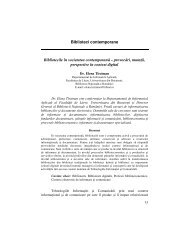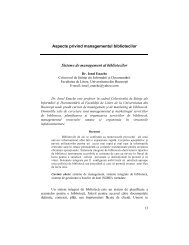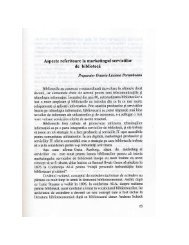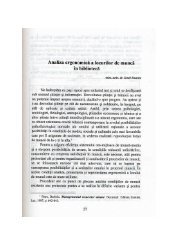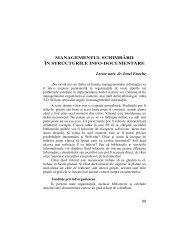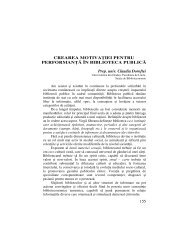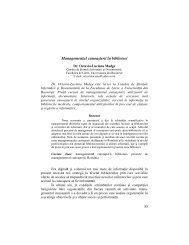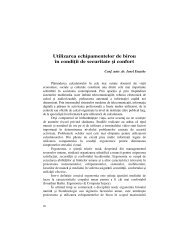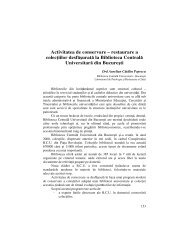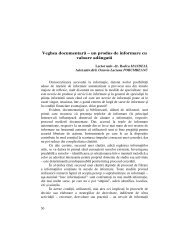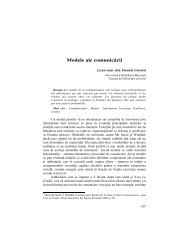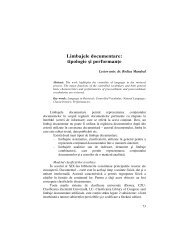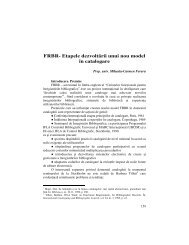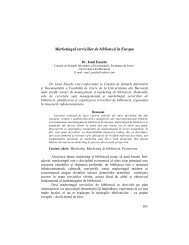Conceptul de cunoaÅtere la Karl R. Popper, Bertrand Russell ... - lisr.ro
Conceptul de cunoaÅtere la Karl R. Popper, Bertrand Russell ... - lisr.ro
Conceptul de cunoaÅtere la Karl R. Popper, Bertrand Russell ... - lisr.ro
You also want an ePaper? Increase the reach of your titles
YUMPU automatically turns print PDFs into web optimized ePapers that Google loves.
Pornind <st<strong>ro</strong>ng>de</st<strong>ro</strong>ng> <st<strong>ro</strong>ng>la</st<strong>ro</strong>ng> întrebarea “Există oare cunoaştere care să fie atât <st<strong>ro</strong>ng>de</st<strong>ro</strong>ng><br />
sigură încât nici un om rezonabil să nu o poată pune <st<strong>ro</strong>ng>la</st<strong>ro</strong>ng> îndoială?”, B.<br />
<st<strong>ro</strong>ng>Russell</st<strong>ro</strong>ng> constată că “întreaga cunoaştere trebuie construită pe convingerile<br />
noastre instinctive şi că, dacă acestea sunt respinse, nu rămâne nimic”(11),<br />
p<strong>ro</strong>blema distincţiei dintre act şi obiect în gândirea noastră asupra<br />
lucrurilor având în viziunea sa o importanţă vitală, întreaga noastră<br />
capacitate <st<strong>ro</strong>ng>de</st<strong>ro</strong>ng> a cunoaşte fiind legată <st<strong>ro</strong>ng>de</st<strong>ro</strong>ng> aceasta.<br />
În precizarea conceptului cunoaşterii, filosoful englez utilizează<br />
analiza conceptuală ca instrument <st<strong>ro</strong>ng>de</st<strong>ro</strong>ng> <st<strong>ro</strong>ng>de</st<strong>ro</strong>ng>scoperire. C. Grecu (12) arată că, în<br />
varianta lui B. <st<strong>ro</strong>ng>Russell</st<strong>ro</strong>ng>, concepţia gnoseologică a atomismului logic poate<br />
fi redusă <st<strong>ro</strong>ng>la</st<strong>ro</strong>ng> următoarele i<st<strong>ro</strong>ng>de</st<strong>ro</strong>ng>i: întâi, se face o <st<strong>ro</strong>ng>de</st<strong>ro</strong>ng>osebire netă între cele două<br />
tipuri <st<strong>ro</strong>ng>de</st<strong>ro</strong>ng> cunoaştere, cunoaştere directă (knowledge by acquaintance) şi<br />
cunoaştere prin <st<strong>ro</strong>ng>de</st<strong>ro</strong>ng>scriere (knowledge by <st<strong>ro</strong>ng>de</st<strong>ro</strong>ng>scription). Primul tip reprezintă<br />
fundamentul cunoaşterii, ireductibil <st<strong>ro</strong>ng>la</st<strong>ro</strong>ng> altceva şi care nu are nevoie şi nici<br />
nu poate să fie justificat prin recurs <st<strong>ro</strong>ng>la</st<strong>ro</strong>ng> altceva în afară <st<strong>ro</strong>ng>de</st<strong>ro</strong>ng> experienţa<br />
senzorială directă, fiind format din p<strong>ro</strong>poziţii atomare. Al doilea tip <st<strong>ro</strong>ng>de</st<strong>ro</strong>ng><br />
cunoaştere, cea indirectă sau prin <st<strong>ro</strong>ng>de</st<strong>ro</strong>ng>scriere, are <st<strong>ro</strong>ng>la</st<strong>ro</strong>ng> bază cunoaşterea prin<br />
contact direct care oferă înţelesul iniţial al termenilor folosiţi într-o<br />
p<strong>ro</strong>poziţie. Este posibil să înţelegem o p<strong>ro</strong>poziţie pe care o auzim pentru<br />
prima dată şi pentru care nu găsim un fapt care să-i corespundă nemijlocit<br />
pentru că înţelegem prea<st<strong>ro</strong>ng>la</st<strong>ro</strong>ng>bil componentele sale, prin intermediul unor<br />
<st<strong>ro</strong>ng>de</st<strong>ro</strong>ng>scrieri în care se folosesc cuvinte şi expresii a că<strong>ro</strong>r semnificaţie o<br />
cunoaştem prin contact direct. Astfel, B. <st<strong>ro</strong>ng>Russell</st<strong>ro</strong>ng> nota: “Putem să<br />
c<st<strong>ro</strong>ng>la</st<strong>ro</strong>ng>sificăm sursele cunoaşterii noastre (…). Mai întâi, trebuie să distingem<br />
între cunoaşterea lucrurilor şi cunoaşterea a<st<strong>ro</strong>ng>de</st<strong>ro</strong>ng>vărurilor. Fiecare are două<br />
tipuri, unul imediat şi unul <st<strong>ro</strong>ng>de</st<strong>ro</strong>ng>rivat. Cunoaşterea imediată a lucrurilor, pe<br />
care am numit-o cunoaştere prin experienţă nemijlocită, constă din două<br />
tipuri, după cum lucrurile cunoscute sunt particu<st<strong>ro</strong>ng>la</st<strong>ro</strong>ng>re sau universalii. (…)<br />
Cunoaşterea <st<strong>ro</strong>ng>de</st<strong>ro</strong>ng>rivată a lucrurilor, pe care o numim cunoaştere prin<br />
<st<strong>ro</strong>ng>de</st<strong>ro</strong>ng>scriere, presupune întot<st<strong>ro</strong>ng>de</st<strong>ro</strong>ng>auna atât cunoaşterea nemijlocită a ceva, cât şi<br />
cunoaşterea <st<strong>ro</strong>ng>de</st<strong>ro</strong>ng> a<st<strong>ro</strong>ng>de</st<strong>ro</strong>ng>văruri. Cunoaşterea imediată <st<strong>ro</strong>ng>de</st<strong>ro</strong>ng> a<st<strong>ro</strong>ng>de</st<strong>ro</strong>ng>văruri poate fi<br />
numită cunoaştere intuitivă, iar a<st<strong>ro</strong>ng>de</st<strong>ro</strong>ng>vărurile cunoscute în acest fel pot fi<br />
numite a<st<strong>ro</strong>ng>de</st<strong>ro</strong>ng>văruri intrinsec evi<st<strong>ro</strong>ng>de</st<strong>ro</strong>ng>nte.<br />
Dacă teoria <st<strong>ro</strong>ng>de</st<strong>ro</strong>ng> mai sus este corectă, întreaga noastră cunoaştere <st<strong>ro</strong>ng>de</st<strong>ro</strong>ng><br />
a<st<strong>ro</strong>ng>de</st<strong>ro</strong>ng>văruri <st<strong>ro</strong>ng>de</st<strong>ro</strong>ng>pin<st<strong>ro</strong>ng>de</st<strong>ro</strong>ng> <st<strong>ro</strong>ng>de</st<strong>ro</strong>ng> cunoaşterea noastră intuitivă. (…) Astfel p<strong>ro</strong>blemele<br />
legate <st<strong>ro</strong>ng>de</st<strong>ro</strong>ng> cunoaşterea a<st<strong>ro</strong>ng>de</st<strong>ro</strong>ng>vărurilor sunt mai dificile <st<strong>ro</strong>ng>de</st<strong>ro</strong>ng>cât acelea legate <st<strong>ro</strong>ng>de</st<strong>ro</strong>ng><br />
cunoaşterea lucrurilor.” (13)<br />
J. Shand (14) observă că pentru B. <st<strong>ro</strong>ng>Russell</st<strong>ro</strong>ng> modul în care cunoaştem<br />
este el însuşi numai o mică parte a ceea ce cunoaştem şi că filosoful<br />
accepta faptul că ar putea exista lucruri pe care nu le putem cunoaşte,<br />
138



